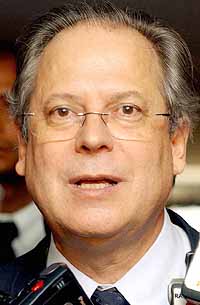|
|
Who is José Dirceu
 José Dirceu de Oliveira e Silva was born in Passa Quatro, state of Minas Gerais, on March 16, 1946. He received a bachelor degree in Law from São Paulo Catholic University (PUC) and is post-graduated in Economy by the same University.
José Dirceu de Oliveira e Silva was born in Passa Quatro, state of Minas Gerais, on March 16, 1946. He received a bachelor degree in Law from São Paulo Catholic University (PUC) and is post-graduated in Economy by the same University.
Dirceu moved to São Paulo City in 1961 to work and study. In 1965, he initiated his Law studies at PUC; that same year, he joined the Student's Central Directory, of which he became leader and, eventually, President.
In 1968, during the 30th Student Association Congress held in Ibiúna (São Paulo), José Dirceu was arrested by the military police, charged of illegal political activities and kept in jail until September of 1969. That year, a terrorist group led by today Federal Deputy Fernando Gabeira kidnapped the American Ambassador Charles Burke Elbrick, who was released in exchange of the freedom of some political prisoners, one of which was José Dirceu.
The episode of the kidnapping became a movie called "O Que É Isso, Companheiro?" (which translates as "What´s that, chap?", but was called "Four Days in September" in English). In 2004, Gabeira was determined to leave the Worker´s Party, but was invited by Dirceu to a last conversation; Dirceu, who by that time was a busy powerful Minister, didn´t even show up for the meeting, and there are no news that he had apologized.
Released, Dirceu exiled in Cuba, where he lived and took military training from 1969 to 1975. In 1975, he returned to Brazil in secrecy, settling in the city of Cruzeiro do Oeste, in the State of Paraná (one of José Dirceu´s sons was elected mayor of the city in 2004).
Dirceu adopted a new name, Carlos Henrique Gouveia de Mello; he got married, without telling his wife who he really was; in 1979, he divorced and returned to Cuba, possibly to undo a plastic surgery.
Dirceu returned to Brazil in 1979, after the Amnesty Law was passed. In November of 1979, he was one of the founders of the Worker´s Party. From the beginning, Dirceu was always one of the most influential voices of the Party; he assumed several positions, until becoming President of the Party in 1995; he resigned to Presidency in 2002, after being elected.
In 1990, he was elected State Deputy in São Paulo. In 1994, he was elected Federal Deputy; in 1998, he run for Governor of São Paulo, but finished third; in 2002, he was again elected Federal Deputy.
Dirceu didn´t take office as Deputy in 2002. From the moment that Lula had won, it was clear that José Dirceu would have a strong presence in the Government. From Dirceu´s official page: "During the government's institutional transition, President-elect Luiz Inacio Lula da Silva delegated him the political coordination of the transition team, with the major responsibility to lead the negotiations with the political parties to gather a support basis in Congress for the new government".
After taking office, Lula appointed Dirceu as Minister Chief of Staff (Ministro Chefe da Casa Civil). In Brazil, the Chief of Staff intermediates the relationships between the Executive and Legislative Powers; all drafts of law are examined by the Casa Civil; all major projects are discussed within Casa Civil. Furthermore, a decree by President Lula determined that all positions in the Government or State companies to be filled by political appointments should be approved by the Casa Civil.
All this made Dirceu the most powerful Minister in Brazil. Lula referred to him once as "the captain of my team". Lula delegated to Dirceu all the tiring and boring negotiations with politicians. Many journalists affirmed that Dirceu was, de facto, the Prime Minister of Brazil.
In May 2005, a low level manager of the Postal Service was caught taking bribery; the manager said that Deputy Roberto Jefferson was involved. After a failing defense, Jefferson denounced the existence of a huge corruption scheme within the government, and such scheme was mentored by José Dirceu.
On June 16th, José Dirceu resigned to his position as Minister and returned to his office as Federal Deputy.
Read more about the scandal in Brazilian government.
Back to Top
|
|

